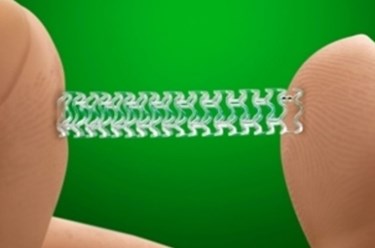Abbott Gains FDA Approval For Fully Dissolving Heart Stent
By Jof Enriquez,
Follow me on Twitter @jofenriq

Calling it a "major advance" in the treatment of coronary artery disease, Abbott has announced FDA approval for the company's first-of-its-kind, dissolving Absorb heart stent, touting it as a safe alternative for patients wary of having a permanent metallic implant.
Widely used heart stents are made of metal coated with drugs to prevent growth of scar tissue. These drug-eluting stents have significantly cut the incidence of restenosis (re-narrowing of the vessel) associated with older, bare-metal stents. However, as the drug coatings gradually dissolve, they leave behind a bare metal scaffold, which remains prone to narrowing and clot formation in the long-term.
The Absorb GT1 Bioresorbable Vascular Scaffold System (BVS) stent works similar to traditional drug-eluting stents, as it releases a drug (everolimus) to limit the growth of scar tissue. However, the distinguishing element is that the scaffold, which is made of a naturally dissolving material (similar to dissolving sutures) that disappears completely in about three years, after the stent has served its purpose of propping open the clogged artery. FDA identifies the bioresorbable material as a type of biodegradable polymer called poly(L-lactide).
"This novel technology appeals to both physicians and patients alike because after treating the underlying blockage it is completely absorbed, leaving nothing behind. No metal means the treated artery can pulse and flex naturally as demands on the heart change with everyday activities. No metal may also reduce the potential of future blockages that occur with permanent metallic stents, and allows easier access to other treatment options should they prove necessary in the patient's future," stated Gregg W. Stone, M.D., FACC, FSCAI, director of cardiovascular research and education at the Center for Interventional Vascular Therapy, Columbia University Medical Center, New York-Presbyterian Hospital, and the chairman of the ABSORB clinical trial program.
An FDA advisory panel in March overwhelmingly voted in favor of the Absorb device, with one panel member describing the technology as a potential “game-changer,” according to the Chicago Tribune.
“The FDA’s approval of the Absorb GT1 BVS offers a new treatment option for individuals who are candidates for angioplasty, but would prefer an absorbable device rather than a permanent metallic coronary stent,” said Bram Zuckerman, M.D., director of the division of cardiovascular devices at the FDA’s Center for Devices and Radiological Health, in a press release announcing the approval.
The ABSORB III randomized clinical trial demonstrated that patients implanted with the Absorb bioresorbable stent had "comparable rates of specific adverse events" compared to those who received Abbott's own Xience drug-eluting metallic stent. The major cardiac adverse event rate was 7.8 percent in the Absorb group, while the control group had 6.1 percent. Rate of blood clots was 1.54 percent for the Absorb group, while the control group experienced a 0.74 percent rate.
The higher risk of heart attacks and blood clots will eventually drop, Abbott claims, as the company trains more surgeons on the implant procedure before ramping up sales, according to Reuters. Absorb will be priced at a "modest" premium to Xience, and will compete with Medtronic's drug-eluting Resolute stent and Boston Scientific's Synergy and Promus stents.
“We’re going to roll this out commercially in a phased way, starting with the sites that have had experience with our clinical trials and proceeding from there,” said Charles Simonton, chief medical officer for Abbott’s vascular business, reports the Wall Street Journal.
